
"Discothèque" is a song by Irish rock band U2. It is the opening track on their 1997 album, Pop, and was released as its lead single on 3 February 1997 by Island Records. The song exhibits influences from electronic dance music, characteristic of the band's musical direction in the 1990s. The music video, directed by Stéphane Sednaoui, was set inside of a mirrorball and featured the band members dressed as members of the disco group the Village People.

"When the Lights Go Out" is the second single released from British group Five's debut studio album, Five (1998). It was released in early 1998. The song was co-written by the group alongside Eliot Kennedy, Tim Lever and Mike Percy, and John McLaughlin. It was co-produced by Kennedy, Lever and Percy, with the US version receiving additional production from Cutfather & Joe.

"Sweetest Thing" is a song by Irish rock band U2. It was originally released as a B-side on the "Where the Streets Have No Name" single in 1987. The song was later re-recorded and re-released as a single in October 1998 for the band's compilation album The Best of 1980–1990.

"Top of the World" is a song by American singer Brandy Norwood, from her second studio album, Never Say Never (1998). The song was written by Rodney "Darkchild" Jerkins, Fred Jerkins III, LaShawn Daniels, Isaac Phillips, Nycolia "Tye-V" Turman, and Mason Betha, with Darkchild and Norwood producing and Mase having featured vocals. Released as the album's second international single in 1998, the track peaked at number two on the UK Singles Chart and reached the top 20 in Iceland, Ireland, and New Zealand.
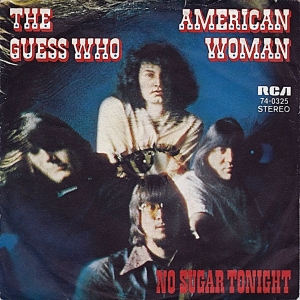
"American Woman" is a song by Canadian rock band the Guess Who, released January 1970, from the album of the same name. It was later released in March 1970 as a single backed with "No Sugar Tonight", and it reached number one for three weeks commencing May 9 on both the United States' Billboard Hot 100 and the Canadian RPM magazine singles chart. Billboard magazine placed the single at number three on the Year-End Hot 100 singles of 1970 list, and it was listed as number five for 1970 on the RPM Year-End Chart. On May 22, 1970, the single was certified as gold by the Recording Industry Association of America (RIAA). It also reached the top ten in the Netherlands, Switzerland and Austria, and the top twenty in the United Kingdom and New Zealand.

5 is the fifth full-length studio album by American rock musician Lenny Kravitz, released on May 12, 1998, by Virgin Records. The album produced six singles released over the course of 1998 and 1999.
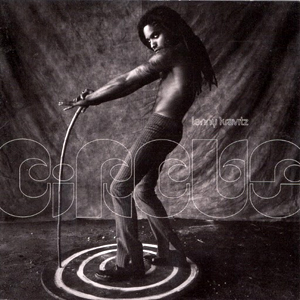
Circus is the fourth studio album by American rock musician Lenny Kravitz, released in 1995 by Virgin Records. It reached number 10 on the US Billboard 200 and number five on the UK Albums Chart, becoming Kravitz's first top 10 album in the US and second in the UK.

"Why Can't We Be Friends?" is a song by American funk band War, from their 1975 studio album of the same name. It has a simple structure, with the phrase "Why can't we be friends?" being sung four times after each two-line verse amounting to forty-four times in under four minutes. The song reached No. 6 on the Billboard Hot 100 in the summer of 1975, and uniquely features each band member singing their own verse. It was played in outer space when NASA beamed it to the linking of Soviet cosmonauts and U.S. astronauts for the Apollo–Soyuz Test Project. Billboard ranked it as the No. 23 song of that year.
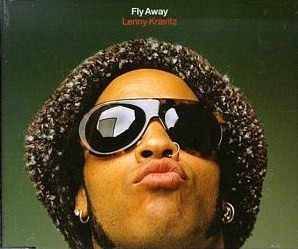
"Fly Away" is a song by American singer Lenny Kravitz. It was released as the fourth single from his fifth studio album, 5 (1998). Released to radio on May 11, 1998, "Fly Away" peaked at number 12 on the US Billboard Hot 100, topped the charts in Iceland and the United Kingdom, and peaked within the top 10 of the charts in several other countries, including Australia, Canada, Ireland, and New Zealand. The song won a Grammy Award for Best Male Rock Performance in 1999.

"Are You Gonna Go My Way" is a song by American musician Lenny Kravitz, released in February 1993 by Virgin Records as the first single from his third studio album, Are You Gonna Go My Way (1993). The song was written by Kravitz and Craig Ross, while Kravitz produced it. It peaked at number one in Australia and number four on the UK Singles Chart, as well as number one on the US Billboard Album Rock Tracks chart and number two on the Billboard Modern Rock Tracks chart. Its music video was directed by Mark Romanek.

"I Belong to You" is a song by American rock musician Lenny Kravitz from his fifth studio album, 5 (1998). It was written and produced by Kravitz and released as the album's third single in August 1998. The song features a soft rock and reggae-inspired sound.
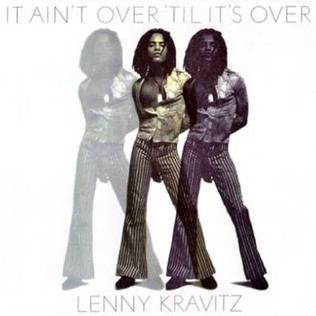
"It Ain't Over 'til It's Over" is a song written, produced, and performed by American musician Lenny Kravitz for his second studio album, Mama Said (1991). Released as the album's second single in June 1991 by Virgin, the song is a mid-tempo ballad musically inspired by Motown, Philly soul, and Earth, Wind & Fire. The horn line at the end is performed by the Phenix Horns from Earth, Wind & Fire. "That song just came out one day, and I knew it had a classic vibe. And I still love that song very much today," Kravitz said in an interview for VivaMusic.com in 2000. The line is based on a Yogiism, or quotation from Yogi Berra: "It ain't over 'til it's over."

"Again" is a song by American rock musician Lenny Kravitz, being the only new song from his first Greatest Hits album, released in 2000. Written, arranged and produced by himself, "Again" was initially set to be on his sixth studio album; however, Kravitz found that the song didn't fit the tone of the album, releasing it instead as the lead single from the compilation on September 22, 2000, through Virgin Records. The mid-tempo rock ballad finds Kravitz wondering if he will ever see his former lover again and if they will reunite once more.

"Rock and Roll Is Dead" is a song by American musician Lenny Kravitz, released in August 1995 by Virgin as the first single from his fourth album, Circus (1995). The song, both written and produced by Kravitz, reached the top 20 in Canada, Finland, New Zealand, and Spain, but it underperformed in the United States, peaking at number 75 on the Billboard Hot 100. The music video for "Rock and Roll Is Dead" was storyboarded by Andrew Trovaioli and directed by Ruven Afanador. It shows Kravitz performing the song with his band, as well as Kravitz with visual artistic related backgrounds. Kravitz was nominated for a Grammy Award for Best Male Rock Vocal Performance for the song in 1996.

"Dig In" is a song by American singer-songwriter Lenny Kravitz, the lead single from his sixth studio album, Lenny (2001). It was released in September 2001. It was used in promos by the National Basketball Association for the 2002 NBA Playoffs, as well as the ending theme for the 2002 Japanese science fiction film Returner.

"Back to You" is a song by Canadian singer Bryan Adams, written by Adams and Eliot Kennedy. It was released in December 1997 as a live acoustic version for Adams' album MTV Unplugged and features students from the Juilliard School, conducted by Michael Kamen. Upon its release, the song became Adams' ninth number-one single in his home country, staying at number one on the RPM Top Singles chart for three nonconsecutive weeks, and reached the top 40 in Australia, Hungary, Iceland, and the United Kingdom. It was later included on his compilation albums The Best of Me and Anthology.
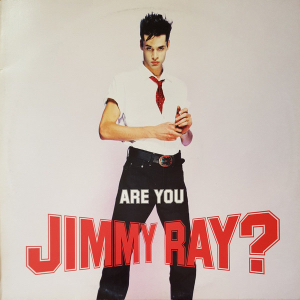
"Are You Jimmy Ray?" is a song by English singer Jimmy Ray. It was released in October 1997 as the first single from his self-titled debut album (1997). The song peaked at number 13 on both the US Billboard Hot 100 and the UK Singles Chart. It was most successful in Canada, reaching number two on the RPM 100 Hit Tracks chart. It has been Jimmy Ray's most popular single to date. Ray later re-recorded this song as "Who Wants to Know" on his second album, Live to Fight Another Day, in 2017.

American singer Lenny Kravitz has released 12 studio albums, one greatest hits compilation album, four box set compilation albums, two extended plays, 63 singles, and eight video albums, including three live albums. His debut album, Let Love Rule (1989), peaked at number 61 in the US, and while receiving generally positive reviews, it became a huge success in Europe but took a long time to reach success in the US. Its followers, Mama Said (1991) and Are You Gonna Go My Way (1993), sold better overall than his debut, achieving platinum and multi-platinum status respectively, establishing Kravitz in the music industry and expanding his success in Europe and South America. However, despite only two years between albums, personal issues such as substance abuse problems, the aftermath of divorce, and his mother Roxie Roker's illness led to a decline in commercial sales with Circus (1995).

"Believe" is a song by American musician Lenny Kravitz, released by Virgin Records on May 10, 1993, as the second single from his third album, Are You Gonna Go My Way (1993). It is a rock ballad with string orchestration, and was co-written, arranged and produced by Kravitz, with Henry Hirsch also contributing to the orchestration and composition. Its lyrics concern one being able to achieve freedom and "eternal grace" if they believe in themselves and put their faith in God.
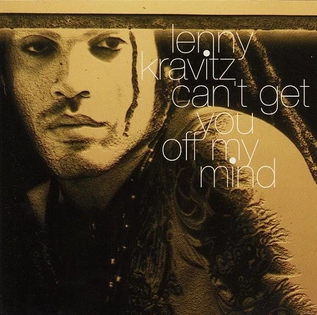
"Can't Get You Off My Mind" is a song written and performed by American singer and songwriter Lenny Kravitz and released in February 1996 by Virgin as the third single from his fourth studio album, Circus (1995). The song was later included in the albums Greatest Hits (2000) and Lenny (2001) as a bonus track. There are two versions of the music video for the song: one was directed by Matthew Rolston, the other by Jim Gable.




















